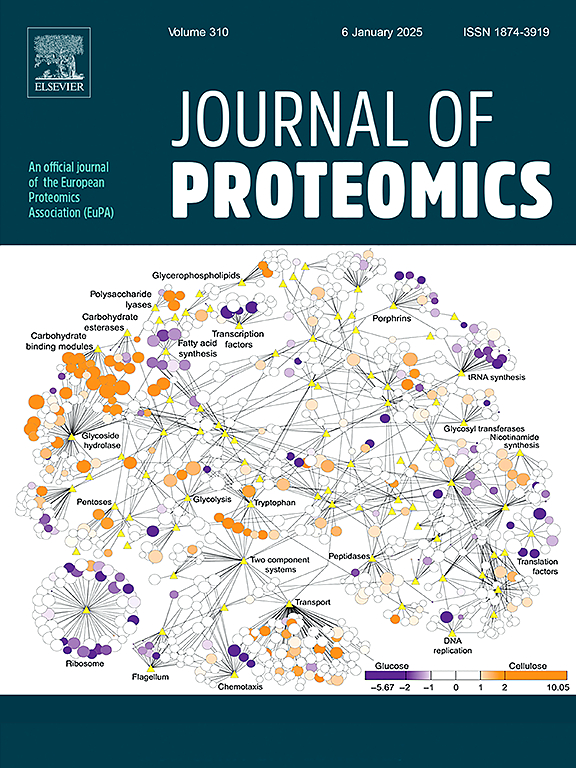Untargeted fast proteomics analysis using UPLC-Orbitrap HRMS for halal authentication of meat and meat products
IF 2.8
2区 生物学
Q2 BIOCHEMICAL RESEARCH METHODS
引用次数: 0
Abstract
The authenticity of halal meat is a global issue because pork adulteration occurs. Certain religions, such as Islam and Judaism, prohibit the use of pork in food products. The purpose of this study was to evaluate the volume of trypsin with 10, 50 and 100 μL (20 μg/100 μL) and the digestion time from overnight to 30–120 min to establish a fast and straightforward procedure on proteomic analysis for halal authentication of meat and meat products. The method was applied to raw meat and processed pork products. The results show that 30 min digestion time and 50 μL of trypsin could detect specific peptides from pork. The proteins such as L-lactate dehydrogenase (D2SW96), haemoglobin subunit beta (F1RII7), carbonic anhydrase (A0A4XIUCS1), and myosin-1 (A0A481AX92) could be the alternative protein that contains specific peptide from pork that could be used as peptide biomarker in raw pork meat. Two peptides from haemoglobin subunit beta (F1RII7) protein heat stable peptide biomarkers were not previously reported. The method is proven for fast analysis, simple protein extraction, and rapid identification of specific pork peptides in raw meat and processed pork products.
Significance
The authenticity of halal meat is a global issue because pork adulteration occurs. Certain religions, such as Islam and Judaism, prohibit the use of pork in food products. Pork is frequently used as an adulterant in high-quality, high-priced meats such as beef, fish meat slices, lamb, or other meat to increase profits because pork is less expensive than the other meats. The purpose of this study was to evaluate the volume of trypsin and the digestion time to establish a fast and straightforward procedure on proteomic analysis for halal authentication of meat and meat products. The results show that 30 min digestion time and 50 μL of trypsin could detect specific peptides from pork. The proteins such as L-lactate dehydrogenase (D2SW96), haemoglobin subunit beta (F1RII7), carbonic anhydrase (A0A4XIUCS1), and myosin-1 (A0A481AX92) could be the alternative protein that contains specific peptide from pork that could be used as peptide biomarker in raw pork meat. To the best of our knowledge, this is the first report that studied on fast analysis, simple protein extraction, and rapid identification of specific pork peptides in raw meat and processed pork products.

使用UPLC-Orbitrap HRMS进行肉类和肉制品清真认证的非靶向快速蛋白质组学分析。
清真肉的真实性是一个全球性问题,因为猪肉掺假时有发生。某些宗教,如伊斯兰教和犹太教,禁止在食品中使用猪肉。本研究的目的是评价10、50和100 μL(20 μg/100 μL)胰蛋白酶的体积和消化时间(过夜至30-120 min),为肉类和肉制品的清真认证建立一种快速、简便的蛋白质组学分析方法。该方法适用于生肉和加工猪肉产品。结果表明,消化时间为30 min,胰蛋白酶浓度为50 μL时,可以检测出猪肉中的特定肽。l -乳酸脱氢酶(D2SW96)、血红蛋白亚基β (F1RII7)、碳酸酐酶(A0A4XIUCS1)和肌球蛋白-1 (A0A481AX92)等蛋白可作为含有猪肉特定肽的替代蛋白,可作为生猪肉的肽生物标志物。两种来自血红蛋白亚基β (F1RII7)蛋白热稳定肽生物标志物的肽此前未被报道。该方法被证明可以快速分析,简单的蛋白质提取,并快速鉴定生肉和加工猪肉产品中的特定猪肉肽。意义:清真肉类的真实性是一个全球性问题,因为猪肉掺假时有发生。某些宗教,如伊斯兰教和犹太教,禁止在食品中使用猪肉。猪肉经常被用作高品质、高价格肉类(如牛肉、鱼片、羊肉或其他肉类)的掺假剂,以增加利润,因为猪肉比其他肉类便宜。本研究的目的是评估胰蛋白酶的体积和消化时间,以建立一个快速和直接的蛋白质组学分析程序,用于肉类和肉制品的清真认证。结果表明,消化时间为30 min,胰蛋白酶浓度为50 μL时,可以检测出猪肉中的特定肽。l -乳酸脱氢酶(D2SW96)、血红蛋白亚基β (F1RII7)、碳酸酐酶(A0A4XIUCS1)和肌球蛋白-1 (A0A481AX92)等蛋白可作为含有猪肉特定肽的替代蛋白,可作为生猪肉的肽生物标志物。据我们所知,这是第一个研究生肉和加工猪肉产品中特定猪肉肽的快速分析、简单蛋白质提取和快速鉴定的报告。
本文章由计算机程序翻译,如有差异,请以英文原文为准。
求助全文
约1分钟内获得全文
求助全文
来源期刊

Journal of proteomics
生物-生化研究方法
CiteScore
7.10
自引率
3.00%
发文量
227
审稿时长
73 days
期刊介绍:
Journal of Proteomics is aimed at protein scientists and analytical chemists in the field of proteomics, biomarker discovery, protein analytics, plant proteomics, microbial and animal proteomics, human studies, tissue imaging by mass spectrometry, non-conventional and non-model organism proteomics, and protein bioinformatics. The journal welcomes papers in new and upcoming areas such as metabolomics, genomics, systems biology, toxicogenomics, pharmacoproteomics.
Journal of Proteomics unifies both fundamental scientists and clinicians, and includes translational research. Suggestions for reviews, webinars and thematic issues are welcome.
 求助内容:
求助内容: 应助结果提醒方式:
应助结果提醒方式:


